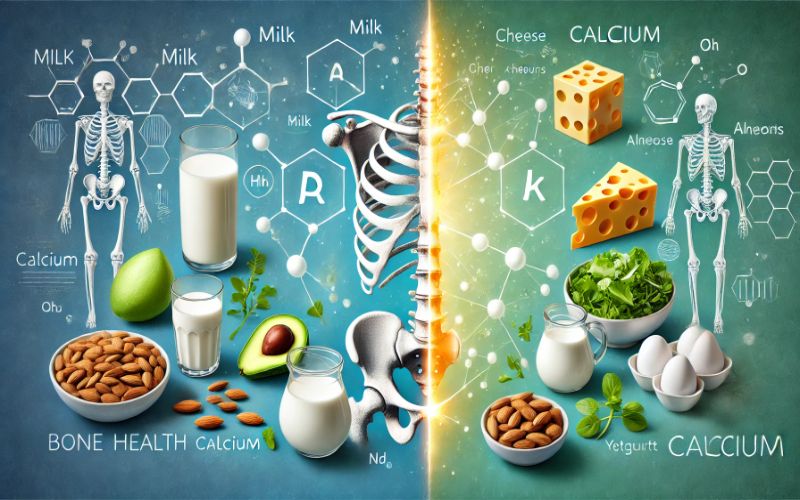
Calcium Deficiency and Bone Health: Key Facts & Tips
Calcium is one of the most important minerals for the human body. It is pivotal in many bodily functions, especially developing and maintaining strong bones and teeth. However, despite its importance, calcium deficiency is a common concern worldwide, with significant long-term consequences, particularly for bone health.
This blog will explain how not having enough calcium can harm your bones. It will also cover the signs and symptoms of a calcium deficiency and why keeping good calcium levels is important for your bone health.
What Is Calcium, And Why Is It Important?
Calcium is an essential mineral, and its primary function is related to bone and dental health. About 99% of the human body's calcium is stored in human bones and teeth, while the remaining 1% of the calcium is found in blood and soft tissues, which are involved in muscle function, nerve transmission, and heart rhythm.
Calcium is essential for bones' structure, strength, and density. Without sufficient calcium rate, bones become weak and brittle, leading to many health issues, including low bone density, fractures, and poor bone development.
How Does Calcium Deficiency Affect Bone Health?
Calcium ensures the presence of strong, healthy bones. When this mineral is lacking, there can be deep impacts on the bone's structure, growth, and density, causing severe bone-related health conditions. Let us see how this calcium deficiency directly affects the health of the bone.
1. Weakening of Bone Structure
Calcium is the mineral responsible for the strength of the bones. Without calcium, bones weaken, resulting in more possibilities for fractures and breaks, even from small falls or bumps. The more bones get used to weakening over time, the higher the possibility of getting conditions like bone thinning or severe bone loss, where one suffers from the extreme loss of bones.
2. Less Mass of the Bones
Bones are in a constant remodeling process. The process of breaking down the old bone tissue and building new bone tissue. In this, calcium is crucial. If there is a lack of calcium in the diet, the body absorbs calcium from the bones for various important activities. This will cause a progressive loss of bone mass, making bones fragile and prone to fractures.
3. Arthritis and Muscular Aches
Calcium is mostly identified with bone health but also participates in muscle contraction and nerve conduction. Low calcium levels cause muscle spasms and joint problems. The body might also experience numbness or tingling in the hands, feet, or face.
4. Inhibited Bone Formation
During childhood and adolescence, the body grows rapidly. The proper growth of bones during this period depends on adequate calcium intake. A lack of calcium will inhibit bone growth, resulting in stunted bone growth, poor bone density, and a higher risk of health issues related to bones later in life.
5. Higher Chance of Bone Weakness
Bone fragility occurs when the bones become brittle and weak and break easily. One of the major causes of bone problems is calcium deficiency, especially in the elderly. The body absorbs less calcium with age, which makes it essential to take sufficient calcium to reduce the rate at which bone loss occurs.
What Is The Cause Of Calcium Deficiency?
Calcium deficiency may arise from several factors, which include:
1. Insufficient Dietary Intake
One of the main sources of calcium deficiency is a poor diet with inadequate amounts of calcium-rich foodstuffs and supplies. Most people do not consume a diet with enough calcium or vitamins, such as dairy products, leafy greens, and fortified foods, leading to a risk of gradual depletion.
2. Deficiency of Vitamin D
Vitamin D is important in the absorption of calcium in the gut. Though you may have enough calcium, poor absorption in the gut leads to a vitamin D deficiency. Calcium remains out of reach of the bones and other tissues. The deficiency of vitamin D, therefore, worsens over time.
3. Age and Gender
As people age, the absorption of calcium decreases, and the risk of calcium deficiency increases. Women, especially postmenopausal women, are at a higher risk due to hormonal changes that affect bone density. Moreover, the body's ability to retain calcium declines with age, leading to bone health concerns in older adults.
4. Some Medical Conditions
Celiac condition, IBD, and kidney issues all weaken the body's absorption capacity for calcium. People affected by these conditions will require a calcium supplement to maintain their desired level.
5. Lifestyle
The lifestyle of the people increases their chances of having a deficiency in calcium. Heavy alcohol intake, smoking, and living a sedentary lifestyle cause disturbances in calcium absorption, weaken the bones, and cause several other discomforts.
Signs And Symptoms Of Calcium Deficiency
Calcium deficiency can occur in various ways, from mild symptoms to severe health problems. Some of the most common signs and symptoms of calcium deficiency include:
Frequent Fractures or Bone Issues: You will likely suffer from fractures or joint issuesvery often or experience chronic bone discomfort, especially if your bones are weak because of low calcium levels. It is often an indication of major bone density loss.
Fatigue and Weakness: Calcium is essential for energy and maintains muscle function. A deficiency causes one to experience fatigue, weakness, and lack of energy.
Numbness or Tingling: Lack of calcium affects nerve conduction. It might cause numbness or tingling around the hands, feet, or face.
Muscle Cramps and Spasms: Low calcium levels cause hand cramps or foot cramps. You might experience sudden contractions that hurt so much it's hard to get relief.
Teeth Problems: As one needs calcium to maintain dental health, it could mean fragile teeth, more cavities, or even gum issues.
Dry Skin and Brittle Nails: Your smooth and glowing skin may appear dry and brittle in low calcium levels, and the nails may easily break or crack.
Prevention And Treatment Of Calcium Deficiency
Supplements are only required in extreme cases. To protect your bones and overall well-being, ensure you take in enough calcium and encourage bone health in various ways. Let's see some great ways to maintain optimum calcium levels.
1. Calcium-Rich Foods
A well-balanced diet comprising calcium-rich foods is the most effective way of maintaining healthy calcium levels. Some of the best sources of calcium are
- Dairy (milk, cheese, yogurt)
- Leafy greens (spinach, kale, collard greens)
- Fortified plant-based milk, such as almond milk and soy milk
- Tofu
- Fish with edible bones, such as salmon and sardines
- Nuts and seeds like almonds, chia seeds, and sesame seeds
2. Vitamin D for Better Absorption
Ensure that you increase your vitamin D consumption to enable the body to absorb calcium. Fattening fish, egg yolks, and fortified foods can be sources of vitamin D. Also, sunlight exposure helps the body produce vitamin D.
3. Calcium Supplements
If you do not get enough calcium from your diet, your doctor may recommend calcium supplements, especially if you are at higher risk for deficiency. Talk to your healthcare provider to determine the right dosage before taking any supplements.
4. Exercise
Regular exercise, especially activities that put weight on your bones, like walking, running, and strength training, can help improve bone density and lower the risk of bone weakness. Exercise stimulates bone formation and strengthens muscles, which protects bones from fractures.
5. Avoid Excessive Alcohol and Smoking
Reducing alcohol consumption and not smoking can help keep your bones healthy and improve calcium absorption. Both smoking and drinking too much alcohol can weaken your bones and interfere with how your body uses calcium.
Conclusion
Calcium is essential to maintaining healthy bones throughout life. A deficiency leads to weakened bones, increased fracture risk, and conditions such as bone depletion. To ensure the best bone health, calcium-rich foods must be consumed, vitamin D levels must be adequate, and regular exercise, along with a lifestyle that minimizes calcium loss, must be followed.
If you suspect calcium deficiency, seek professional medical attention to be diagnosed and treated properly.
FAQs About Calcium Deficiency and Bone Health
How much calcium do I need daily?
Recommended daily calcium intake varies based on age and gender. It is 1,000 mg daily for most adults, increasing to 1,200 mg for women over 50 and men over 70.
Are there any side effects of taking calcium supplements?
Taking too much calcium can cause side effects, such as constipation, kidney stones, and impaired absorption of other minerals. It's important to follow your doctor’s recommendations for supplementation.
